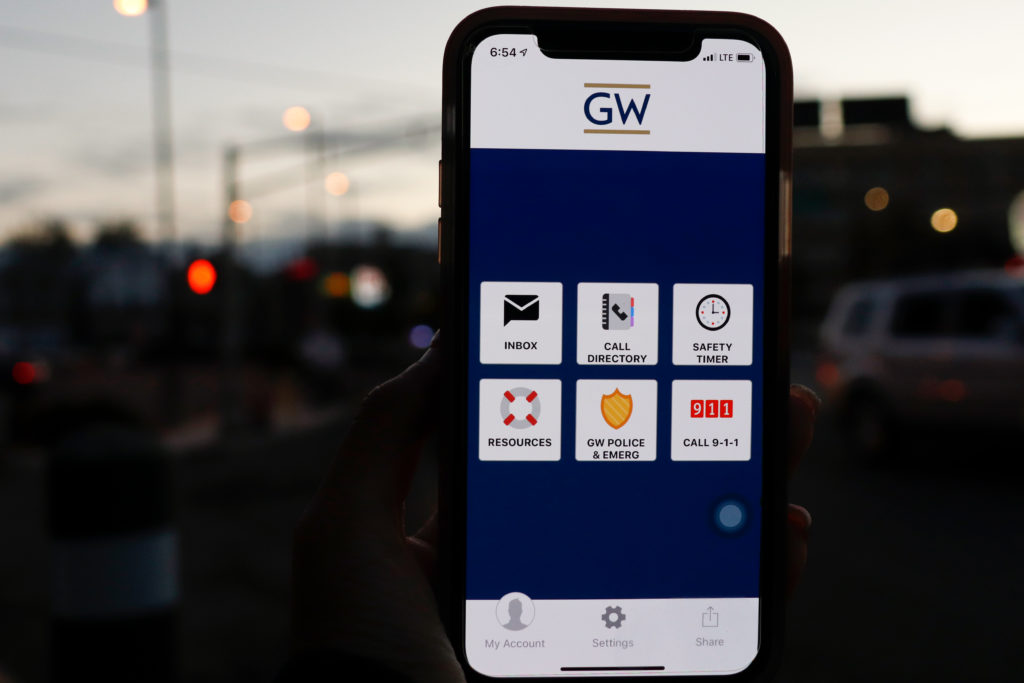Officials released an upgraded campus safety app during virtual orientation last month that includes a wider selection of digital features and hotlines.
University spokesperson Crystal Nosal said the new app, called GW Guardian, will replace the previous campus safety app, GW PAL, which students could use to either call a SafeRide or send an alert to the GW Police Department. Nosal said the new app will carry more utilities than its predecessor and will continue to roll out new features “that will benefit the GW community.”
“The Guardian app is integrated with our GW Alerts system and has far more robust features that integrate with our GW Dispatch systems than the GW Pal app,” Nosal said in an email. “Rave Guardian has determined best practices after working with a number of large businesses and other universities and can offer extensive support.”
The app includes links to the National Sexual Assault, Domestic Violence and Suicide hotlines, the Network for Victim Recovery of D.C. and the Poison Control Center. Students can also reach GW’s Title IX Office, the Office of Advocacy and Support, Campus Advisories and SafeRide, according to the app.
Students can use the app to create a personal profile with emergency contacts and medical history information, which responders can see when students call EMeRG, GWPD or 911.
Students can also use a “Safety Timer” that indicates how long someone may take to get home, allows students to contact GWPD and sends an alert with a student’s location to a list of family and friends if the timer expires.
Nosal said the University’s Health and Emergency Management Safety team, consisting of GWPD, GW Dispatch and the offices of Emergency Management and Advocacy and Support, helped develop the new app, which nearly 140 students have downloaded as of Friday.
“We believe it will give them quick access to the resources they need and provide them with an alternate way to receive alerts,” Nosal said.
Nosal said officials will further advertise the app when the majority of students return to campus.
Senior Kent Trespalacios, a two-year member of the Division of Safety and Facilities’ Student Advisory Board, said GW Guardian improves upon GW PAL because it offers students a larger selection of features, including the phone directory and the Safety Timer. Officials planning system upgrades have also considered adding a messaging system through which GWPD officers can communicate and track students asking for help, he said.
“When I downloaded the app when I first got to GW, I realized that it could be better, and I believe that the newer version is that better version because it has more features that students are more inclined to use,” Trespalacios said.
Trespalacios, who lives off campus, said the app gives him “peace of mind” while walking around a quieter campus in the evening because he can alert GWPD about his whereabouts on the app.
“I would feel comfortable knowing that I have this app that is connected to the police department, and if I needed help, assistance would not only be able to get to me, but they’ll also have a detailed profile of me,” he said.
Experts in sexual violence and criminology said the app would help students feel connected to resources like EMeRG in case of an emergency, but it may not successfully prevent crime.
Joseph Schafer, a criminology professor at St. Louis University, said the app won’t reduce the number of incidents that may occur on campus but can still help students take responsibility for personal safety, react to incidents and make phone calls more quickly than before.
“A number other than 911 – I doubt most students, faculty, staff would know that off the top of their head,” he said.
Monika Lind – a doctoral candidate at the University of Oregon and a research associate at the Center for Institutional Courage, a nonprofit advocacy group for transparency and responsibility among institutions like colleges – said GW Guardian may not be helpful in preventing sexual assault on campus. She said the app’s features like the Safety Timer are geared to help students when they’re approached and assaulted by a stranger, which she said is the rarest form of sexual assault.
She said most cases of sexual assault occur when the assailant and victim know each other, an outcome she believes the app fails to address. When students walk home with someone they know, they won’t be as likely to take out their phone and call for help because they think their company will keep them safe, Lind said.
“In terms of the prevention piece, I would not expect this app to be timely and helpful for people who are actually at risk of being sexually assaulted or in the process of being coerced or whatever because it’s so often someone you know,” she said.








